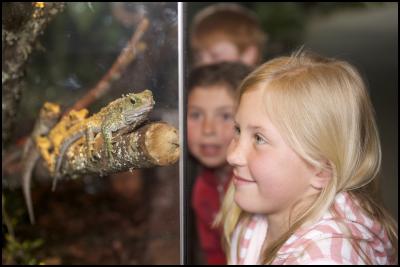Rainbow Springs calls on Kiwi kids to name tuatara
News Release
Rainbow Springs calls on Kiwi kids to
name tuatara

Rotorua, 15 July 2011 – Rainbow Springs is calling on New Zealand children to come up with the perfect name for their tuatara mascot.
The much loved Rainbow Springs Kiwi Wildlife Park in Rotorua park decided to launch the naming competition to mark the successful hatching of ten baby tuatara a couple of months ago. These rare reptiles are extremely hard to breed and the hatching is thought to be one of the largest ever in captivity.
The child who comes up with the winning name will win a family holiday in Rotorua including two nights’ accommodation and a family pass for two adults and two children to Rainbow Springs.
Rainbow Springs General Manager Michelle Caldwell says “Rainbow Springs is dedicated to the conservation of New Zealand’s endangered animals and believe that education is an important part of the preservation of our native species. Through this competition we hope children will learn a little bit about New Zealand’s oldest living animal – the tuatara."
The ten precious tuatara siblings are being looked after carefully by the team at Rainbow Springs and are expected to go on display to the public in October.
To enter the naming competition, children can email info@rainbowsprings.co.nz with suggestions by August 1. They should also include their name, address, age and phone number.
The tuatara is an ancient reptile which roamed the earth at the same time as the dinosaurs more than 225 million years ago. Because the tuatara outlasted its relatives which died out some 60 million years ago they are sometimes called a ‘living fossil’.
Rainbow Springs also has another exciting multi-million dollar project in development, which includes the construction of 'Project Splash' a high-tech water ride flowing through the ecological evolution of New Zealand. The ride is due to open in December and will the first of its kind in New Zealand.
Tuatara Facts:
• Tuatara have the potential
to live up to 300 years in the right conditions. The average
life span is 80 - 100 years. The oldest in captivity is
Henry who is 120 - 130 years old in the Tuatarium at
Invercargill.
•
• Tuatara take 35 years to grow
to their full size of 600mm (24 inches or 2ft). They also
have the longest incubation period of any reptile with eggs
taking up to 15 months to hatch.
•
• In cooler
temperatures during winter their metabolism slows down to 10
heart beats per min and 1 breath per hour. During this time,
because their metabolism has slowed they don't require
food.
•
• They can survive without eating for a
year.
•
• Tuatara are ‘stand-and wait’
carnivores that snatch almost any small animal straying
within reach, including weta, spiders, skinks, geckos, and
even birds and their eggs or chicks.
•
• Juvenile
tuatara are often diurnal (active during the daytime) to
avoid being prey for larger (largely nocturnal)
tuatara.
•
• In Māori tuatara means 'spiny back'
and refers to the row of spines down its
back.
•
Rainbow Springs Kiwi Wildlife Park is an
icon of New Zealand tourism and has been open since 1932.
Spread over 22 acres of Rotorua parkland, Rainbow Springs is
a conservation and breeding haven for endangered New Zealand
species such as Kiwi and tuatara. The park offers a unique
wildlife experience for visitors, who can see animals in
their natural environment, both during the day and night.
Features of the award winning tourist attraction include New
Zealand’s first ‘open to view’ Kiwi hatchery, and a
range of wildlife including trout, tuatara and native
birds.
ends


 International Writers' Workshop NZ Inc: Ōtepoti Poets Top The Kathleen Grattan Prize For A Sequence Of Poems
International Writers' Workshop NZ Inc: Ōtepoti Poets Top The Kathleen Grattan Prize For A Sequence Of Poems NZ Amateur Sport Association: 22 Amendments Proposed For 2022 Act Lodged On 22 November
NZ Amateur Sport Association: 22 Amendments Proposed For 2022 Act Lodged On 22 November Auckland University of Technology: Reading Helps Children Face A Difficult Future
Auckland University of Technology: Reading Helps Children Face A Difficult Future PATHA: Puberty Blocker Evidence Brief Affirms Aotearoa’s Approach
PATHA: Puberty Blocker Evidence Brief Affirms Aotearoa’s Approach Tataki Auckland Unlimited: Into Ocean & Ice - Unveiling Antarctica's Past And Present
Tataki Auckland Unlimited: Into Ocean & Ice - Unveiling Antarctica's Past And Present Health Coalition Aotearoa: Urgent Action Needed To Address Aotearoa’s Shameful Household Food Insecurity
Health Coalition Aotearoa: Urgent Action Needed To Address Aotearoa’s Shameful Household Food Insecurity